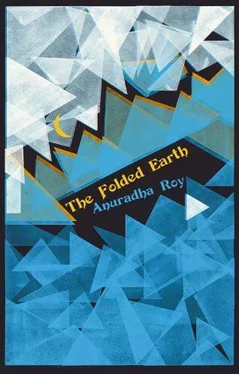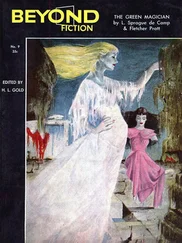Diwan Sahib’s baritone was interspersed with fits of coughing and he searched in his long-unused trousers for a handkerchief. I passed him a tissue. The constable tapped her pencil on the table. Then she spun a five-rupee coin on it again and again like a top and waited each time till it rattled to a halt.
Puran was not raising the deer with a view to eating it, Diwan Sahib continued patiently. He had rescued it from the forest. If he had not rescued it the lost deer would have been devoured by other animals.
“That is the law of the jungle,” the constable interrupted him to say. “And the deer is a wild animal.”
“Of course,” Diwan Sahib said, “and in every other instance you would be absolutely right. But Puran is a special case. Did you know that — ”
A note of ingratiation crept into his voice. I had never seen him bend over the way he was doing now. He smiled at her as if trying to please.
The constable interrupted again. Nothing was possible, she said. She began to shuffle her papers and files. She looked Diwan Sahib up and down with scarcely concealed disdain. She had been posted to Ranikhet only a few months before, and had no idea who he was. To her, he looked like any other rain-soaked, old, small-town man — educated, no question — but she had no time for such refinement and slow civilities. She had risen the hard way, she was tough, her tongue was sharp, and as a policewoman she had to be feared and respected, not loved. All this was written on her face. No doubt, too, she could smell the rum on Diwan Sahib’s breath. His big hands, even when resting on her table, shook with the tremor that we were familiar with but which she must have thought another symptom of his drunkenness. Her eyes went to his feet. He had managed a shirt, trousers, and jacket, but his feet had been too swollen for shoes and he had pushed them into purple bathroom slippers. She looked at the wet, mud-spattered slippers and back at his face. “The law is the law,” she stated. “I have work to do. It is illegal for people to keep wild animals at home whether as pets or as food. He is no different from anyone else in the eyes of the law.” She returned to her file and did not look up again.
Mr Chauhan had left instructions that if Puran came after the deer, he was to be locked up until the deer was safely in Nainital’s zoo, and for a few days after, to teach him a lesson. If anyone made a fuss, Mr Chauhan had ordered, tell them this is a non-bailable offence under the Wildlife Protection Act and Puran would have to serve a proper jail term for fattening a barking deer in order to kill and eat it. “And while you are at it,” he had instructed the constable, “I want those army clothes off him, and burned, this time to ashes.” Having issued his instructions, Mr Chauhan had left for Bhimtal.
* * *
Puran came home in someone else’s clothes after three days. He went into his ramshackle shed and would not emerge, not even to eat. We heard from a friend in Nainital that Rani was moping and pining in her new cage at the zoo, and had refused food and water. All day she stood virtually immobile in a corner of her cage, despite the persistence of the zoo’s vet. A week later, the vet advised a revolutionary step: he wanted Puran brought to Nainital. “That’s the only hope,” he said, “the deer might eat if he feeds it.”
Mr Chauhan’s permission was sought. He slammed the telephone down, fuming. “Here I am, the Ad-Min-is-Trator of this city,” he said, emphasising every syllable with a rap of his pen on the desk. “And they want me to give all my time to these foolish matters!” It would be the ultimate humiliation for him to have to send Puran to Nainital. He would not hear of it. He got into his jeep, its large pimple of a red beacon gleaming, and went off to inspect the site of a new amusement park, his flagship project, for which a swathe of oak forest was being cleared. It was pointless saying to tourists, “Come just for the peace and the landscape.” Ranikhet was to have sights. It must generate as much revenue as Bhimtal and Nainital, Mr Chauhan had decided, and once he decided something, he acted. This was no time for nonsense with madmen and deer. He told his secretary to say he was in meetings all day if there were more calls from the zoo.
On the thirteenth day, the deer died of malnutrition, dehydration, and grief. It became a small news item in the local paper and a journalist came to interview Puran for a “human interest” feature. Ama, frantic with excitement at the thought of her son being in the newspaper, showed him to the cowshed Puran had taken refuge in. The journalist walked to the shed as gingerly as a stork in a marsh and waited ankle-deep in mud and dung for Puran to emerge, but despite Ama’s knocks, entreaties, scoldings, and curses he remained inside his shed and would speak to nobody.
* * *
On the evening of our fruitless visit to the police station, I went up to the Light House. When Veer was away, I often went there for a drink and sometimes dinner and sat by Diwan Sahib’s fire before returning home to my exercise books. That day, when I entered the half-dark living room, I saw him crouched over the fireplace, feeding paper into it from bundles lying at his feet. He put in sheaf after sheaf. The fire dipped as each thick bunch of paper was added to it, and then blazed when the new lot of paper caught. I did not have to ask Diwan Sahib what he was doing. I could see it was years of work he was burning, his and mine, the many versions of his Corbett book. His hands shook as he reached for the papers and then for the fire. He was bent close enough over the flames for the room to smell faintly of singed hair. Droplets of a runny cold shone in the firelight as his nose dripped. He swiped it once with a sleeve, then continued. When the entire manuscript was in the fire, he stood up, staring into the leaping flames. Then he seemed to remember something else. He looked above the fireplace at the framed picture of his golden retrievers. I leaped forward now, with a cry, but I was too late to stop him. He had flung it into the blaze, and the glass shattered against the logs in the fireplace. The old wood of the picture’s frame caught instantly. I saw the photograph curl at the edges and melt away.
I could not account for it on a rational level, but after the death of the deer a whispering began in my head that pointed to change, an alteration so profound and yet so inexplicable as to seem more superstition than logic. It was as if we were standing before a still expanse of water and only I could sense a shark slicing through it below the surface, heading for us. On the brightest days, I felt as if the corner of a deep shadow was edging in, inch by imperceptible inch, until it was no longer a corner but a darkness that in time would obliterate us.
I grew morbidly obsessed with wondering what had happened to Rani’s body in the zoo. They would call it a carcass. I remembered our neighbour’s Alsatian in Hyderabad — a handsome, smiling dog with a long tail that the family never talked to or petted because they considered it a guard dog, too dangerous to touch. I used to scratch his head for him on my way to school. One day, I saw a man cycling down the road before our houses with a gunny bag trailing off his back seat from a long rope. The gunny bag cleared a swathe of dust on the earthen road as he went past. The man hunched forward and pedalled with an effort in the way people do when cycling with a heavy load. Later I learned that the Alsatian had died, and that the family had despatched its body in a sack strung from that bicycle, to be thrown into the municipal dump.
Was Rani’s body rotting in a dump along with other rubbish? Was it being torn apart by rats? Perhaps the zoo had fed her carcass to their leopards in cages. But there cannot have been much flesh on that delicate fawn’s half-starved body. I told myself that the vet, who had tried to save her life, had carried Rani’s body to the kind of forest she had been born in, and left it there for it to return slowly to the earth again. I tried to make myself believe that this was what happened.
Читать дальше












